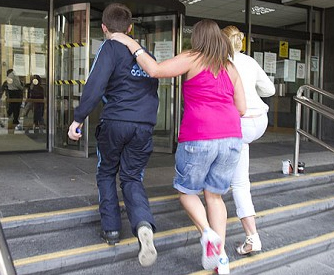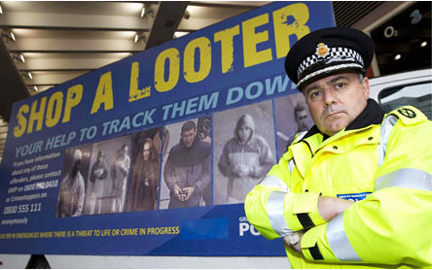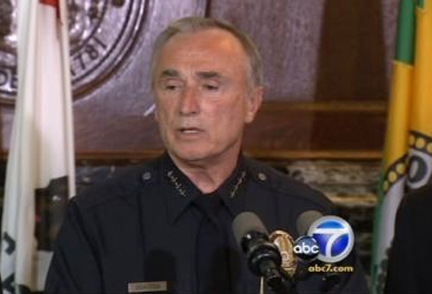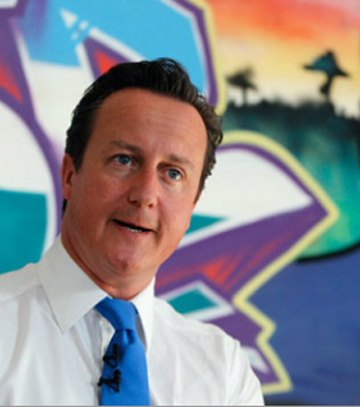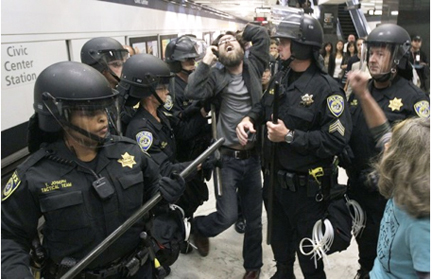By Mickey Friedman
August 16, 2011
Interesting new developments from the riots across the sea. Amidst the calls to curtail the use of social media – and the arrests of a few Facebook posters and Blackberry instant messengers for incitement – comes the case of the Tweeting Bobbie. The rioters took advantage of the new technology to communicate, and it was Tory Member of Parliament Louise Mensch, who urged that instant messaging and tweets be suspended during riots:
“If riot info and fear is spreading by Facebook and Twitter, shut them off for an hour or two, then restore. World won’t implode,” she said.
If you remember, David Cameron, the British Prime Minister, he of the compassionate Conservatism and friend to the Murdochs, just happened to be out of town when the rioters first struck. Along with his Home Secretary. But once back he lost no time casting blame: on moral decay and the morally-decayed, the rioters and their parents, or the lack thereof, and the slacking police, too slow, too permissive, perhaps?
And, then, looking to turn things around, Cameron reached across the Pond to ask one of U.S. of A’s most famous police chiefs, William Bratton, to help solve what clearly had become the U.K.’s new crime problem.
Well, one copper, Assistant Chief Constable Garry Shewan of the Greater Manchester Police (GMP,) took offense at the slights. And like any smart in-the-know citizen of the new reality, went on to Twitter to let the world know he wasn’t pleased with David Cameron. The assistant chief, in charge of the effort to find the looters, thinks he knows a thing or two about policing. He just happens to have a masters degree in criminology. His first tweet informed the world that the prime minister hadn’t even been to Manchester recently: “Cameron has not been to GMP to see how we have reduced crime & ASB, tackled gang violence & raised public confidence, he could do worse.” (ASB, in turns out, is an acronym for anti-social behavior.)
His second tweet might have something to do with the sense that some in the British police ranks think they might not need help from the Colonies: “Been to US twice in last year to look at policing. I have come back feeling proud of where policing is in UK – integrated with communities.”
The home secretary, Theresa May, managed to earn Shewan’s ire when, after she returned home from holiday, went on TV to say she “ordered” additional police onto the streets. Shewan’s third tweet reminded everyone: “With respect I am unsure what the home secretary thinks that she told GMP to do different. She listened but said nothing. Tactics were ours!”
Meanwhile Cameron keeps on talking about “zero tolerance,” a kind of policing he sees as prosecuting all kinds of offenses, large and small, to send a clear message that no form of lawlessness will be tolerated. Unfortunately, he seems to have misconstrued the subtlety of William Bratton’s kind of policing. Bratton who worked in Boston, the transit police in New York, then as chief of the NYPD and as chief in L.A. believes the most important piece of the crime puzzle is prevention, and how critical it is to reconnect the police to communities they serve. Bratton, more than almost anyone, knows how deep cuts in police manpower, and social programs like drug treatment, plus the lack of jobs, make effective policing ever more difficult.
Cameron might profit from taking a moment to read Bratton’s essay, “Crime Is Down In New York City: Blame The Police.” He might not have used the expression “Zero Tolerance.” Bratton wrote:
Clearly, zero tolerance conveys a forceful message about the importance of civility and order in complex societies and about the need for police to restore and maintain order. But it sends other messages as well, and this is what worries me about the equation of ‘New York-style’ policing with zero tolerance.
First, the phrase smacks of over-zealousness—a real danger when communicating expectations about policing. No one familiar with the business of order maintenance really believes that complex problems such as prostitution, aggressive begging, drug dealing, teen drinking, and others are going to be eradicated in society. They can be managed: that is, they can be reduced and their social costs lessened, but such problems have been, and always will be with us.
Second, it is not a credible policy: it communicates to political leaders and the general public an unrealistic view of what police can accomplish … For too long, police and other criminal justice agencies have sent ‘tough’ messages to offenders and miscreants and then have not been able to deliver, either because of limitations on their power (limitations that are given in democracies) or because of lack of resources and facilities.
Third, and finally, zero tolerance as a slogan belies the complexity of police work … Reviving order maintenance as an integral aspect of policing requires leadership, planning, training, guidance and ongoing managerial direction. Given its potential for crime prevention and the improvement of the quality of urban life, it is well worth the effort. Improperly and unthinkingly done, however, order maintenance has considerable potential for trouble, especially in the form of improper, discriminatory, or abusive policing.
Consequently, zero tolerance is neither a phrase that I use nor one that captures the meaning of what happened in New York City, either in the subways or on the streets. (Pp. 42-3)
Assistant Chief Constable Garry Shewan is not the only police official concerned with what the prime minister is saying. Chris Sims, the chief of West Midlands police, issued a statement on Sunday afternoon saying his force would not be “slavishly adopting empty slogans.”
Cameron plunged on ahead over the weekend, declaring at an address at a youth center that his government had identified 120,000 families across the UK that cause much of the disturbance in communities across the country. He called the rioting a “wake-up call” for the country and pledged his administration would promote policies to address the causes of “broken Britain” and “turn around the lives of the 120,000 most troubled families” by the time of the next election.
Someone in the Cameron camp must have reminded him about his own vulnerability on the broken Britain morality front, because he added the recent irresponsibility in high places to his litany of failures:
In the banking crisis, with MPs’ expenses, in the phone-hacking scandal, we have seen some of the worst cases of greed, irresponsibility and entitlement. The restoration of responsibility has to cut right across our society.
Do we have the determination to confront the slow-motion moral collapse that has taken place in parts of our country these past few generations?
Irresponsibility. Selfishness. Behaving as if your choices have no consequences. Children without fathers. Schools without discipline. Reward without effort.
Crime without punishment. Rights without responsibilities. Communities without control. Some of the worst aspects of human nature tolerated, indulged – sometimes even incentivized – by a state and its agencies that in parts have become literally de-moralized.
So do we have the determination to confront all this and turn it around? I have the very strong sense that the responsible majority of people in this country not only have that determination; they are crying out for their government to act upon it. And I can assure you, I will not be found wanting.
As for Twitter and Facebook, Cameron seems to have zero tolerance. His government summoned representations of those two social-networking sites, as well as someone from Blackberry to discuss the roles they played during the riots.
“Everyone watching these horrific actions will be struck by how they were organized via social media,” Cameron told Parliament. “Free flow of information can be used for good. But it can also be used for ill. And when people are using social media for violence, we need to stop them.”
Meanwhile back here in the States, on Thursday, August 11, 2011 officials at the Bay Area Rapid Transit company decided they would try to undermine a planned demonstration to protest the killing of 45-year-old man by transit police at the Civic Center station. In a preemptive move that I imagine Cameron could only envy, BART officials turned off their cellular network on the system denying passengers the ability to use their cellphones. Commuters at stations from downtown San Francisco to near the city’s main airport were affected.
BART officials revealed they made the decision after they saw details about the protest on an organizer’s website. BART Deputy Police Chief Benson Fairow told KTVU-TV that the issue boiled down to the public’s well-being:
It wasn’t a decision made lightly. This wasn’t about free speech. It was about safety,” Fairow declared. He revealed BART had extra staff aboard trains during that time for anybody who wanted to report an emergency, as well as courtesy phones on station platforms.
But not everybody at BART was happy about the decision. Lynette Sweet, a member of BART’s board of directors told the AP:
I’m just shocked that they didn’t think about the implications of this. This is a land of free speech and for us to think we can do that shows we’ve grown well beyond the business of what we’re supposed to be doing and that’s providing transportation not censorship.
But let’s end where we began: in the land of the riotous youth. As officials try to figure out exactly what happened and why and what to do about, things became even more complicated when two officials at the London Metropolitan Police offered interestingly different evaluations of social media and the part they played.
According to BBC News: “Assistant Met Police Commissioner Lynne Owens told a committee of MPs officers learned of possible trouble via Twitter and BlackBerry messenger … But Acting Commissioner Tim Godwin said he had considered asking authorities to switch off social networks. He said they provided intelligence but could also be misleading.”
Owens said that officers had attempted to sift through an “overwhelming” amount of “chitter chatter” on social networks during last weeks, and that some had proved vital:
“Through Twitter and BBM there was intelligence that the Olympic site, that both Westfields [shopping centers] and Oxford Street were indeed going to be targeted … We were able to secure all those places and indeed there was no damage at any of them.”
Tim Godwin, acting Met police commissioner, made the point that much of the information coming via social media “was obviously wrong and rather silly” but acknowledged police did consider trying to shut the networks down in order to prevent them being used to organize further violence.
“We did contemplate, I contemplated, asking the authorities to switch it off. The legality of that is very questionable and additionally, it is also a very useful intelligence asset,” he said.
“So, as a result of that, we did not request that that was turned off, but it is something that we are pursuing as part of our investigative strategy.”
Which leads me to wonder if someone tweets a riot that doesn’t happen, is that a riot prevented or a riot invented? And can one be prosecuted for instigating a riot invented? Tweeting fire in an imagined theater?
And one last thought: Both the websites of Blackberry in the UK and BART in the U.S. were hacked by the group known as Anonymous for their alleged collaborations and instigations in acts of censorship. Is this a case of Zero Tolerance with Zero Tolerance?
————-
Well so much for speculation and commentary. In the time it took to write this, reality intervened, and all this took a drastic turn. The British newspapers are announcing the sentencing of two young Facebook users, Jordan Blackshaw, 20, from Northwich, and Perry Sutcliffe-Keenan, 22, from Warrington, to a sentence of four years in prison.
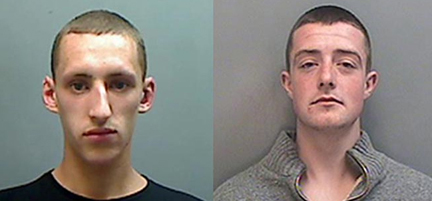
Perry Sutcliffe-Kennan, 22 and Jordan Blackshaw, 20 - Sentenced to four years in jail for Facebook incitement.
According to the Guardian, Assistant Chief Constable Phil Thompson said:
If we cast our minds back just a few days to last week and recall the way in which technology was used to spread incitement and bring people together to commit acts of criminality, it is easy to understand the four year sentences that were handed down in court today.
In Cheshire, we quickly recognised the impact of the situation on our communities and the way in which social media was being used to promote and incite behaviour that would strike fear in to the hearts of our communities.
According to Michael Rundle of the Huffington Post UK, police learned that Sutcliffe-Keenan had set up a Facebook page to encourage rioting in Warrington called “Let’s Have a Riot in Latchford.” Blackshaw had created a Facebook page titled “Smash Down Northwich Town.”
Rundle wrote:
Neither of the men were successful, but the recorder of Chester, Elgin Edwards, said he hoped the sentences would act as a deterrent.
According to Assistant Chief Constable Phil Thompson:
From the offset, Cheshire constabulary adopted a robust policing approach using the information coming into the organisation to move quickly and effectively against any person whose behaviour was likely to encourage criminality. Officers took swift action against those people who have been using Facebook and other social media sites to incite disorder.
The sentences passed down today recognise how technology can be abused to incite criminal activity, and send a strong message to potential troublemakers about the extent to which ordinary people value safety and order in their lives and their communities.

